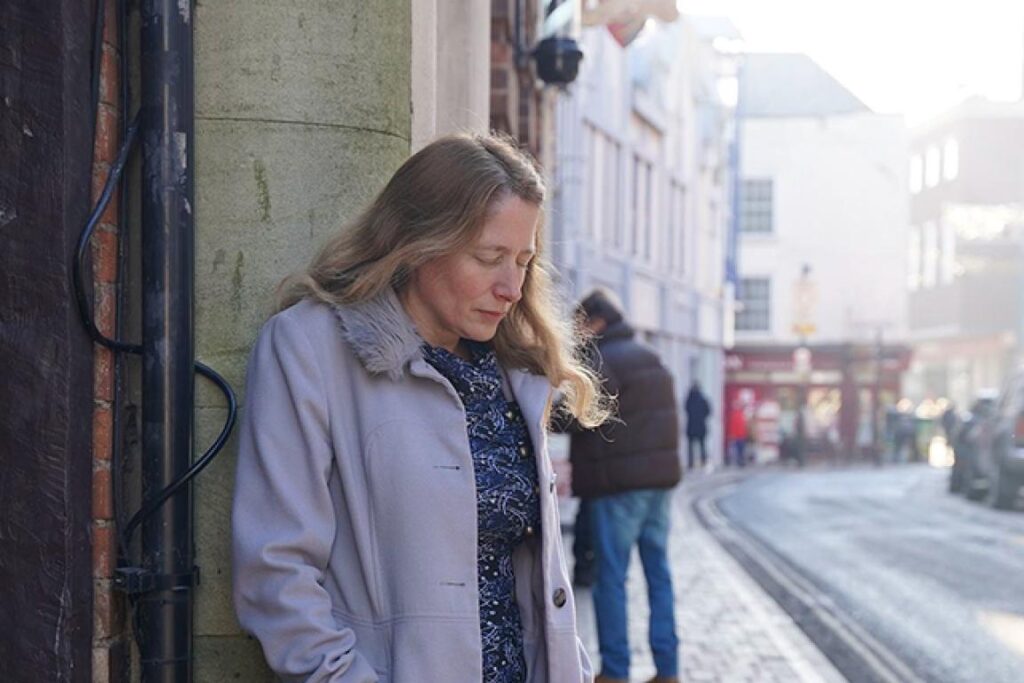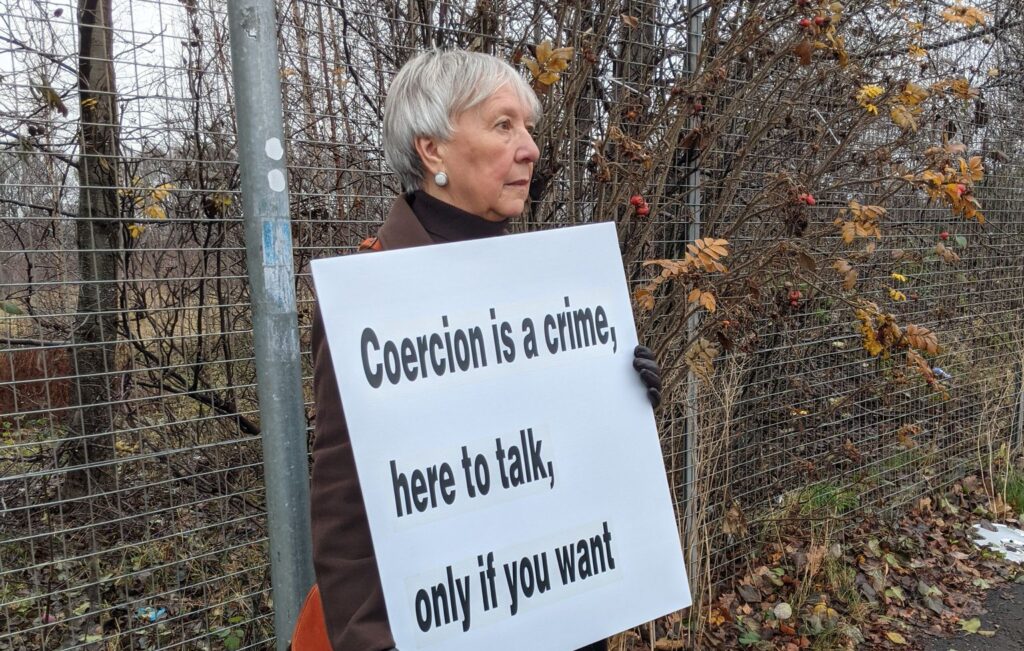You are currently viewing a placeholder content from YouTube. To access the actual content, click the button below. Please note that doing so will share data with third-party providers.
More InformationProtect the right to think and speak freely.
In Britain and elsewhere, Christians are facing fines and even arrest simply for peacefully living out their faith. So-called “buffer zones”—areas around abortion facilities where certain activities are banned—are being used to punish acts such as holding a sign offering consensual conversation and silently praying.
How can a thought be made criminal?
“Buffer zones” have been used to prosecuted individuals for silent prayer on the public street. But silent prayer is not a crime—it’s simply the act of raising one’s internal thoughts to the divine. Freedom of thought is an unconditional right. Yet, these zones have made silent prayer in public spaces a punishable offence.
“Free speech, I fear, is in retreat”, said U.S. Vice President J.D. Vance in an address to world leaders at a security conference in Munich in February. Among growing examples of censorship in Europe, he highlighted the case of Adam Smith-Connor, a British army veteran convicted in November 2024 for silently praying across the street from an abortion facility in Bournemouth, England.
Reflecting on his concerns for Europe, the Vice President said: “…perhaps most concerning, I look to our very dear friends, the United Kingdom, where the backslide away from conscience rights has placed the basic liberties of religious Britons, in particular in the crosshairs.
“A little over two years ago, the British government charged Adam Smith Connor, a 51-year-old physiotherapist and an Army veteran, with the heinous crime of standing 50m from an abortion clinic and silently praying for three minutes, not obstructing anyone, not interacting with anyone, just silently praying on his own.”
Support Adam, Livia, and Isabel and protect the freedom to think and speak today
Your generosity allows us to provide legal support at no cost to our courageous clients.
Their Stories
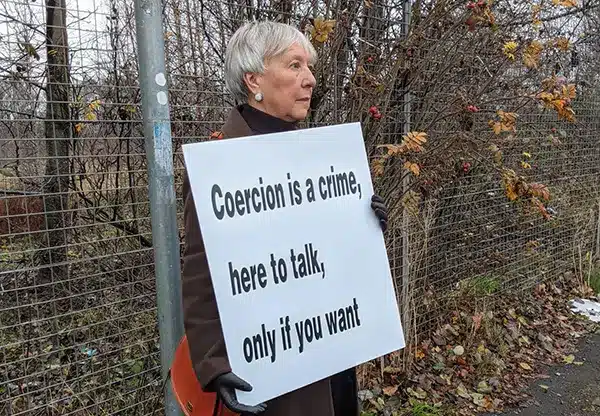
Arrested twice for holding a sign
On 19 February 2025—and again on 24 September 2025—Scottish grandmother, Rose Docherty, was arrested simply for holding a sign that read, “Coercion is a crime, here to talk, only if you want,” in a “buffer zone” in Glasgow.
Rose has been charged and released on bail. With our legal support, she went to court on 19 December, facing the consequences of simply standing peacefully for what she believes is right.

Rose Docherty

Isabel Vaughan-Spruce
Targeted again for silent prayer
Having already received £13,000 in compensation from the police for being wrongfully arrested twice for silently praying near an abortion facility, charitable volunteer Isabel Vaughan-Spruce has been criminally charged again. She is the first person to be prosecuted under the national “buffer zone” law.
Isabel has been under investigation since January 2025 for her silent prayers and holding pro-life beliefs in a “buffer zone” on a public street near an abortion facility in Birmingham. ADF UK is supporting her legal defence.
“Silent thought cannot be a crime”
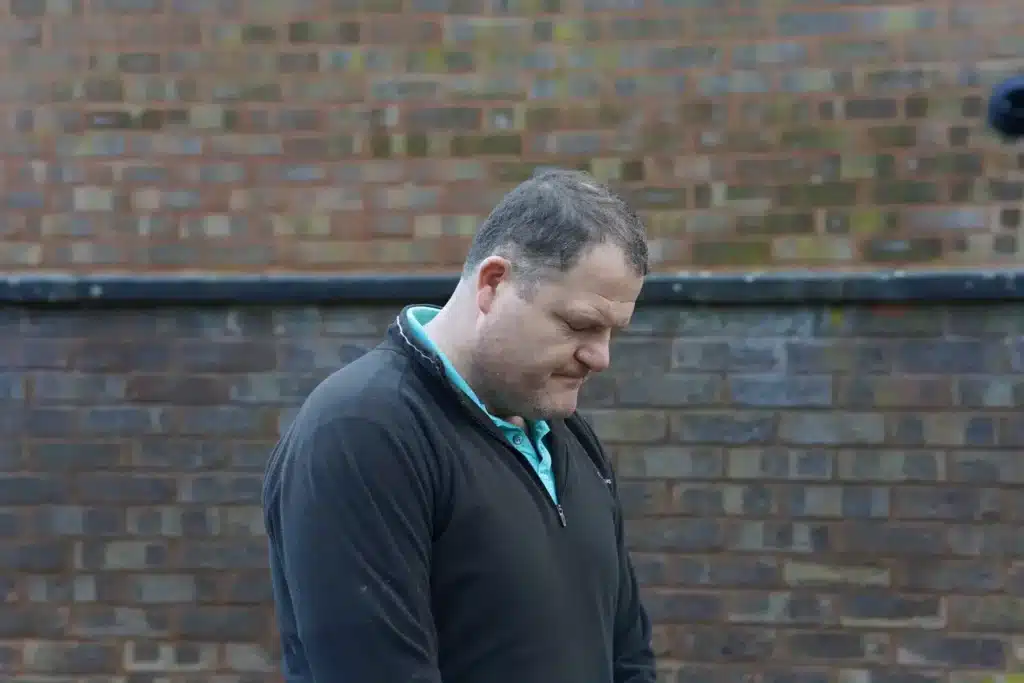
In October 2024, army veteran Adam Smith-Connor faced trial for three minutes of silent prayer outside an abortion facility. Adam stood quietly, with his back to the facility, praying for his son whom he had lost 24 years ago due to an abortion.
For that, the Poole Magistrates’ Court convicted him and ordered him to pay £9,000 in prosecution costs, all for breaching a “buffer zone”.
With ADF UK’s support, Adam is fighting back. His appeal is due to be heard in the upcoming fall or winter.

Adam Smith-Connor
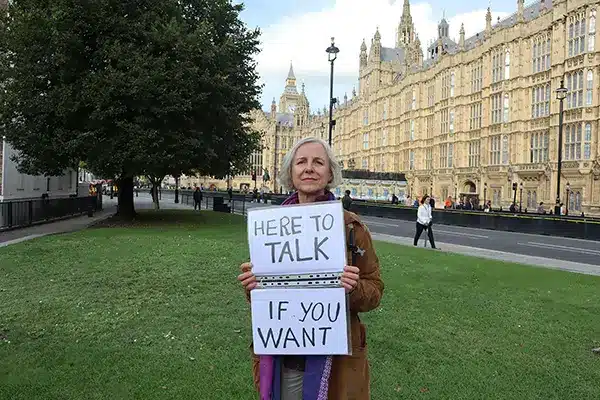
Livia Tossici-Bolt
Put on trial “for offering to hold consensual conversation”
Livia Tossici-Bolt, a retired medical scientist with a compassionate heart, stood outside an abortion facility, offering a conversation to anyone who wanted one—just a simple sign with the words, “Here to talk if you want”.
But in today’s Britain, that was enough to land her in court. Charged under a “buffer zone” law, Livia faced prosecution for exercising her basic human rights. She was tried at Poole Magistrates’ Court on 5 and 6 March 2025.
We are awaiting an appeal hearing. ADF UK is supporting her legal defence.
“Are priests still allowed to pray on the streets of Britain?”
Catholic priest Fr. Sean Gough was charged for silently praying within the same Birmingham “buffer zone” as Isabel Vaughan-Spruce. He spoke no words but held a sign reading “Praying for free speech” to express his intentions. Authorities added a further charge because his car, parked nearby, displayed a small “Unborn Lives Matter” bumper sticker.
For these peaceful acts, Fr. Sean was accused of “intimidating service users” at the abortion facility—despite the clinic being closed at the time.
With legal support from ADF UK, Fr. Sean was fully acquitted in March 2023.
Father Sean Gough

Under far-reaching and vaguely-written rules, we have seen volunteers like Livia criminalised simply for offering conversations to those in need; and others dragged through courts for praying, even silently, in their minds.

Jeremiah Igunnubole
Legal Counsel for ADF UK

FAQ
A censorship zone sets out a defined area around an abortion facility that prevents citizens from engaging in otherwise legal activities within it. Prohibited activities can include offering leaflets about crisis pregnancy support services, or even praying quietly alone. Censorship zones around abortion facilities can include several streets within their circumference and are usually intended to prevent any contact between citizens entering a facility and those engaging in pro-life activities.
Censorship zones are sometimes referred to as ‘buffer zones’, ‘bubble zones’ or ‘access zones’ by their proponents. The problem with this terminology is that it suggests that there is a need for society to be ‘buffered’ from all of the activities included in such measures, many of which are reasonable or even beneficial to others. While everyone condemns harassment – which is already a crime – censorship zones have been instrumentalised to criminalise people peacefully offering help, or simply thinking pro-life thoughts, on public streets.
ADF UK stand firmly against harassment against women in any circumstances. Censorship zones (so-called “buffer zones”) aren’t the solution to protecting women from harassment. Harrassment is illegal in England, Wales and Northern Ireland under – to name just one example – the Protection from Harassment Act 1997 (and the adjacent Protection From Harassment (Northern Ireland) Order of the same year). In Scotland, if someone is engaging in harassment, they can be subject to a non-harassment order. If that order is breached, it’s an offence with up to 2 years jail time. Censorship zones, then, wouldn’t newly ban harassment. They would, however, newly ban other forms of behavior which are perfectly legal, protected in human rights law under freedom of speech, thought, and assembly, and indeed can be a vital lifeline to women.
In 2018, the UK Home Office reviewed the situation outside abortion facilities nationwide. Considering evidence gathered about harassment, the Home Secretary at the time said this: “…what is clear from the evidence we gathered is that these activities are not the norm, and predominantly, anti-abortion activities are more passive in nature. The main activities reported to us during protests include praying, displaying banners, and handing out leaflets.” (Since 2018, there has been no evidence of a substantive escalation of any violence, abuse, or harassment outside of abortion facilities). The Home Secretary thus concluded, “Introducing national buffer zones would not be a proportionate response, considering the experiences of the majority of hospitals and clinics, and considering that the majority of activities are more passive in nature.” This conclusion corresponds with the testimonies of women who say they felt helped, not harassed, by volunteers in nearby abortion facilities. Alina Dulgheriu is one such woman who has made her story public. She was alone, abandoned, and jobless when she found herself in a crisis pregnancy. Like almost 1 in 5 women who have abortions, she felt pressured into the decision. She thought she had no choice but to abort her child. Fortunately, Alina received a leaflet about help available, right at her point of need. She chose to accept the offer and flourishes as a mother today. Find her story, as well as others, at www.behereforme.org.
PSPOs were designed to grant local authorities the power to target particular anti-social activities such as dog fouling, control of fires & barbecues etc. Parliament did not intend such orders to be used as unaccountable tools to restrict fundamental rights and freedoms.
Unlike Court Orders, injunctions or other targeted measures, PSPOs are not targeted at any specific individual and are easier for councils to implement with more limited accountability and scrutiny.
The question of intentions is a good one that ought to be more common in debates concerning criminal law. Increasingly, we are seeing criminal laws apply without reference to the accused’s intentions, with the feelings of the accuser treated as almost sacrosanct, and officers unthinkingly arresting individuals in public spaces based on reports that some bystanders are offended instead of considering the fundamental rights at play.
In a democratic society, being offended by others is a given. It is a significantly less costly price to pay than ceding fundamental rights to the state. We know from history that once fundamental rights are ceded, the state will very rarely, if ever, willingly give them back.
The law should be able to differentiate between silent unassuming prayer and charitable offers of help and criminal harassment and intimidation. PSPOs conflate all of these, bringing the threshold of criminality to an impermissibly low level. The government should look at the PSPO legislative regime and either scrap it in its entirety or expressly prohibit any interference with the peaceful exercise of fundamental rights.
The reference to intimidation in Isabel’s charge is particularly alarming. At all material times, Isabel prayed silently while the abortion facility was closed. The wording of the charge appears to accuse her of intimidating by silent prayer, which is wholly new territory.
This question misses the point and displays the basic religious illiteracy that has been all too common from British police officers in recent years ranging from the routine arrest of street preachers to denying the late David Ames MP access to priests.
Of course, Isabel or Adam could have prayed at home. But the more pertinent question is whether or not the state can legitimately restrict their ability to pray silently about abortion in a public space.
A climate protester standing next to Isabel or Adam would not have been arrested. Assuming Isabel kneeled in prayer to God and was next to a campaigner doing the same for BLM, only Isabel would have been arrested. Isabel was arrested for the nature of her thoughts, who she was thinking towards (God) and where she was thinking them.
Silent prayer is possibly the most private action that one could manifest in public – an expression of thought. In a free and fair democracy, everyone sometimes feels discomfort when confronted with a different thought or idea. Part of upholding an equal society is allowing for diversity in the public square. Although someone might find the idea of public prayer outside of an abortion facility disagreeable, this doesn’t mean it’s right to arrest and restrict the rights and freedoms of others.
In Scotland and Northern Ireland, proposed national buffer zones legislation broadens criminal liability to any “influencing activity”. The scope of this term is so vague and unclear that it betrays the basic rules of good law. Indeed, the scope is so broad that it would inevitably lead to numerous unjust arrests and needless interferences with the fundamental rights of people to think and speak on the public street freely. In a recent submission to the Supreme Court, the Lord Advocate for Scotland clarified her belief that silent prayer should be treated the same as violent or threatening behaviour, alleging that silent prayer could be ‘psychologically damaging’.
West Midlands Police’s tweet was misleading to the extent that it purports to be a clarification. It a) omits the terms of the PSPO and b) provides incomplete details of the charge.
The tweet also suggested that Isabel was arrested ‘to protect women from harassment’ when seeking an abortion. But they appear to have missed a crucial fact: the abortion clinic was closed when Isabel prayed. No woman would have been seeking an abortion at that time.
And even if the abortion centre was open, standing still and unassuming in a public space is an impermissibly low bar for criminal liability. Parliament did not introduce PSPOs to reduce the threshold of criminal harassment to include peaceful and harmless conduct.
For those who remain unconvinced that pro-life volunteers outside abortion facilities help women, please see the accounts of these women.
Pro-choice advocates should see the glaring inconsistency in arguing for a woman’s right to choose abortion while simultaneously denying their right to choose to engage in offers to discuss charitable alternatives to abortion.
A woman’s freedom to choose to keep her child does not suddenly disappear as she approaches the public spaces around an abortion centre.
The idea that a decision has already been made ignores the fact that women are often unsure, coerced, confused or otherwise pressured toward abortion.
Importantly, the idea that a woman has already made her decision when approaching the abortion centre cannot be reconciled with the fact that abortion centres are themselves meant to provide counselling support, including support for those wishing to keep their child.
Such support would be unnecessary if it is assumed that the visiting woman has already made an unchangeable decision.
No. The paramount rights in law, in this case, are freedom of thought and religion. Freedom of thought is an absolute right, which means the state cannot interfere with it under any circumstances.
Freedom of religion can only be interfered with by the state when strictly necessary and proportionate to do so. Given that Isabel and Adam both stood and prayed silently in a public space, it is hard to see how an arrest, prosecution or penalty fine could ever be justified.
Stay Informed
"*" indicates required fields

